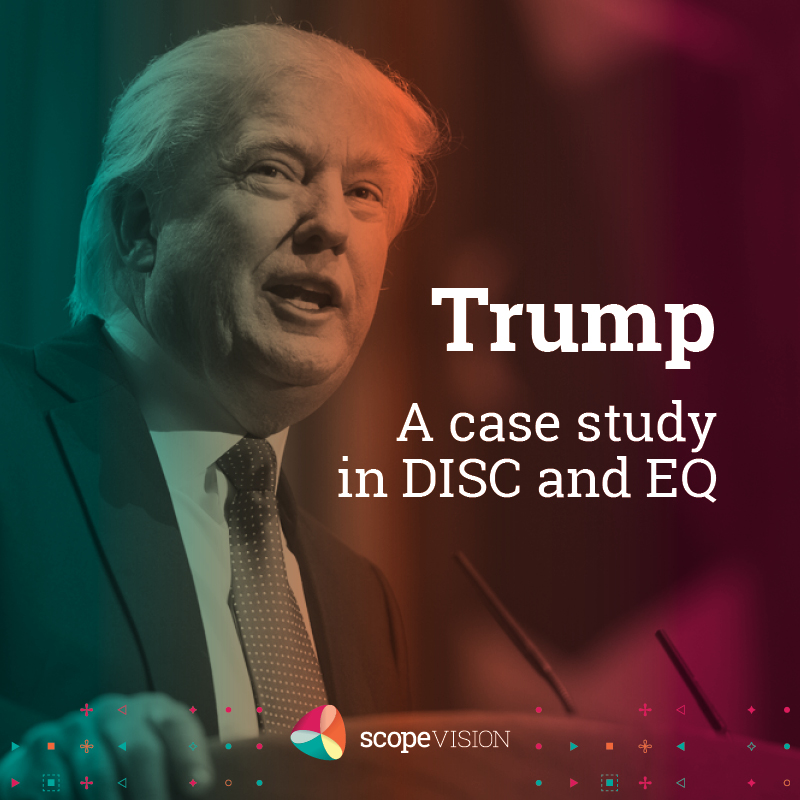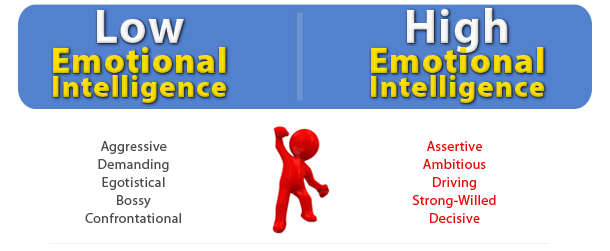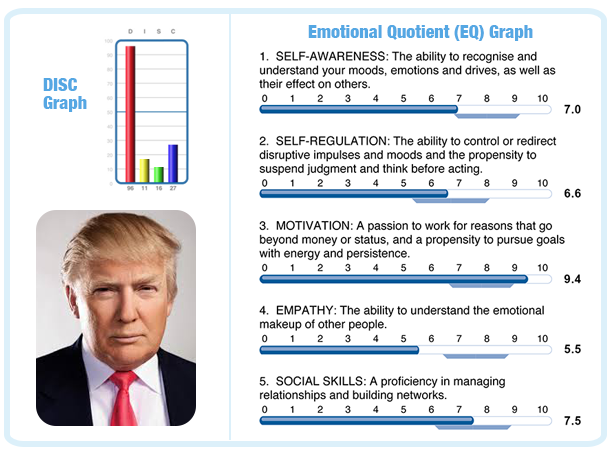When it comes to the DISC assessment, there are few better examples of a “core” dominance (D) style than The Donald.
People with a high D behavioural style are often described as:
- Assertive
- Competitive
- Direct
- Decisive
- Challenging
- Pioneering
Clearly, Trump ticks all the boxes for D tendencies.
But, then again, a lot of people tick all the boxes for D tendencies and they are not as fiercely disliked as Trump.
Two people can share the same DISC pattern and yet come across as completely different people. Consultants who are trained in DISC — and only in DISC — may find this puzzling. One manager with a high D style may be loved by her team and the consultant will hear comments like: “She’s a real doer; a human dynamo; a natural born leader.” And another manager with precisely the same style may be loathed: “She’s a psychopath; a wrecking ball; a born bulldozer of feelings.”
How could this be? What accounts for this difference?
Enter emotional intelligence (EI).
EI is vital to understand because it forms the basis of social effectiveness and has the power to bring out the best (and worst) traits in our behavioural (DISC) style.
Emotional intelligence is a broad term for a sophisticated skill set that, like leadership or creativity, is considered to be very important but rather difficult to define. In business and academia, there are many different models (or ways of conceptualising) emotional intelligence. Looking at EI through the prism of the Goleman model, we can see that EI is not one skill but five highly interrelated abilities. By separating out these strands of EI and exploring them one by one, we are able to add more depth to our perspective as we build a more nuanced, multifaceted portrait of an individual.
Let’s look at the EI of Trump
Trump appears to be highly driven, so naturally we would give him a very high score in motivation. Self-awareness and self-regulation, on the other hand, we would argue are somewhat lower. Empathy; a lot lower. Social skills are more difficult to pin down — so let’s explore this area further.
Many recent comments by Trump have exposed vulnerabilities in his social skills, suggesting a repeated tendency to miscommunicate, confuse viewers, and unintentionally damage important relationships. The evidence for this conclusion includes (but is not limited to) the remarks about Mexican immigrants that led to his sponsors pulling out; the suggestion that John McCain was not a war hero which angered many within his own ranks; and the “blood coming out of her wherever” insult toward journalist Megyn Kelly. Trump later clarified that he meant her nose and ears, denying he was implying she was menstruating. He added, “I think only a degenerate would think that I would have meant that” — a comment that was notably taken to task by Jimmy Fallon.
Social skills are underpinned by the other four pillars of EQ. Self-awareness and self-regulation — that is, being aware of, and in control of your moods — are essential to good communication. As the saying goes, “Speak when you are angry and you'll make the best speech you'll ever regret.”
The emotion commonly associated with the D style is anger; however, there is a big difference between a high D with high self-regulation and a high D with low self-regulation. This is something that troubles many about Trump as a genuine presidential contender: when his ego is rattled, he comes out swinging.
Many coaches and consultants we meet are asked to work with business executives who share the same DISC and EI patterns as Trump. The mistake we see too frequently from these consultants is only acquiring behavioural (DISC) information. Without going deeper than DISC, the consultant won’t be able to recognise the real issues at play. He is like a doctor who lacks the proper diagnostic equipment to help his patient.
Humans are a complex puzzle, with many facets. Trump, like all humans, is a case study in that complexity, capable of saying highly intelligent, pleasing, common sense things, and minutes later infuriating millions by a clumsy and insensitive outburst.
Whether you agree or disagree with the EI analysis of Trump above, the point is that there is more to the picture than DISC. Ultimately, organisational consultants and coaches are beginning to recognise the need to move beyond just focusing narrowly on someone’s behavioural profile and toward building a more complete picture with the use of multiple assessments.
If you are interested in exploring EI further, Scope Vision is able to assist you throughout your profile journey, don't hesitate to contact them direct.
Our featured guest blogger
Theo Winter works as Client Services Manager, Writer & Researcher for TTI Success Insights Australia, a leading provider of assessment-based talent management solutions. He is among the youngest in the world to have received accreditation in the TTI Success Insights suite of assessments, and has worked with hundreds of HR, L&OD professionals and business consultants seeking to bolster the emotional intelligence, engagement and performance of managers and their teams. Theo is passionate about positive psychology, neuroscience, intelligence, science education, creativity and personal development literature. He has written over 200 articles on topics such as leadership, recruitment, talent management, performance management, employee engagement, psychometric testing, career development, emotional intelligence, psychology and human behaviour.













